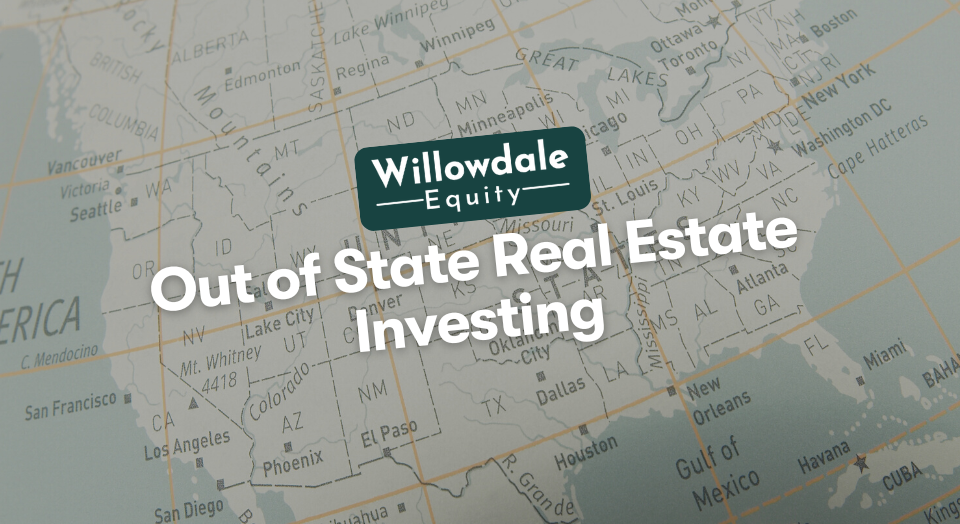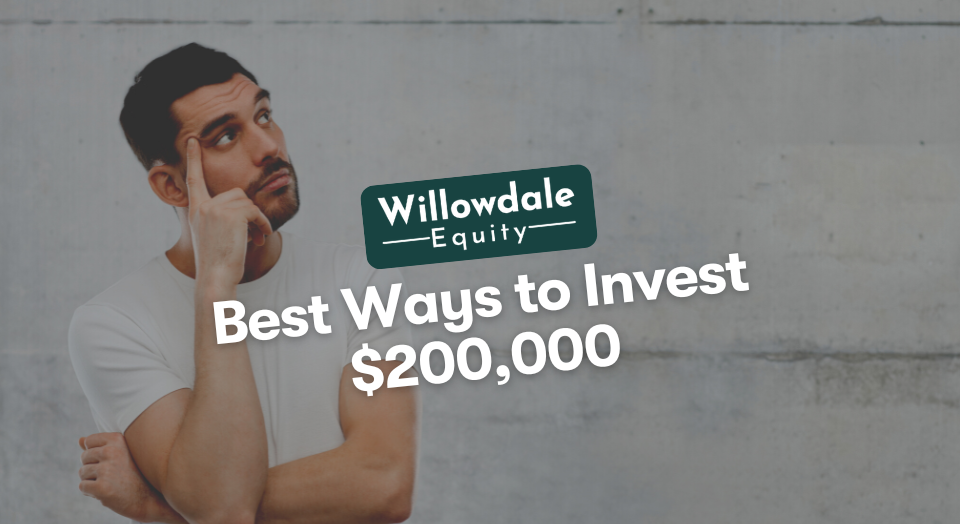
Out of State Real Estate Investing: What You Need to Know
You’re not alone if you’re interested in out-of-state real estate investing. Many people are looking to invest in property outside their own state, and there are many great reasons why. In this blog post, we will discuss some of the things you need to know before making your first out-of-state investment.
We’ll cover due diligence, finding the right property, and understanding the local market. So if you’re considering buying investment property out of state, read this post!
Key Takeaways
-
There are several ways to find rental properties to invest in out of state. The simplest thing you can do is work with a local realtor or broker who specializes in investment properties.
-
There are a few risks that come with out-of-state real estate investing. The degree of risk depends on several factors, such as your ability or intent to look at a property physically before you buy it.
-
The most severe risk of investing in rental properties out of state is the risk of hiring the wrong property management company.
-
The best solution to this is by working with other investors to buy into assets together. This is done through a real estate syndication and an excellent option for out-of-state investors because it allows them to invest without having to do extra work or be located in the same state as the asset.
Buying Investment Property Out of State
Out-of-state real estate investing is simply buying property in a different state than your own. There are a lot of reasons why this can be a great idea. For starters, out-of-state investments can offer greater returns than local investments. Additionally, due to high demand and high pricing in your area, real estate investing may be more challenging than in other states.
Investing Out of State: How do you find rental properties to invest in out of state?

There are several ways to find rental properties to invest in out of state.
- The simplest thing you can do is work with a local realtor or broker who specializes in investment properties. They will have an extensive database of properties to choose from and can help you find the perfect investment.
- Another option is to search for out-of-state property on your own using online resources like Realtor.com or Zillow.com. This can be time-consuming, but it gives you more control over which properties you see.
- The third way is to attend out-of-state real estate auctions and bid on properties there. This can be a great way to find out what’s available in your area of interest, but it may require some travel time depending on how far away from home you want to look for rental investments. It’s also important to look up the auction rules where the auction is being held.
You can also work with real estate wholesalers that specialize in finding real estate below market value. Wholesalers are people who sell distressed real estate below market value to investors. They usually get the houses from people in a hurry to sell or those who need to sell their homes for some other reason. They charge a small fee in exchange for the real estate investor having the opportunity to buy the investment property.
Financing Out of State Investment Property
Depending on the financing you are looking to leverage, acquiring your out-of-state investment property can be easy or difficult. If you’re acquiring a single-family property, using one of the many nationwide lenders to finance it shouldn’t be of any issue as long as you have some sort of balance sheet or track record of ownership. When it comes to larger commercial assets like multifamily property, lenders can be a bit more particular with out-of-state investors because larger properties with more doors are highly operational. Since your are not in the state where the property resides, some lenders feel that could hinder management performance.
This isn’t always a problem, but for some lenders, it is, and just because its a problem, it doesn’t mean you can’t get financed; it just might mean you might get a slightly less preferred interest rate, leverage, or maybe the lender might require your to escrow more reserves to get the loan. It’s lender by lender discretion, so make sure you shop around.
Risks of Owning Rental Property Out of State
There are a few risks that come with out-of-state real estate investing. There are:
- Higher Cost Due Diligence
- Having the Right Team
- Your Investment Strategy
- Local Laws & Regulations
Higher Cost Due Diligence
The degree of risk depends on several factors, such as your ability or intent to look at a property physically before you buy it. Suppose you plan on physically seeing a property before adding it to your real estate portfolio. In that case, you will increase your odds of purchasing the right property in the condition you expected it to be in.
However, if this is the case, you must factor in your travel costs since they would never have been incurred had you invested in your local real estate market. Due diligence is the most critical thing when figuring out if a property would make an excellent real estate investment or not, so it can’t be skipped.
Having the Right Team
If you have absolutely no intentions of walking through a property before pulling the trigger on it, then you must build a reliable team on the ground that can do the work for you. It’s a good idea to get multiple contractors to walk the property to let you know what the actual cost of repairs will be. It’s also a brilliant idea to contact a real estate agent in that market to get their opinion on the value of the property and its rental potential. It would help if you also did your homework in the area. This means the state, city or town, and neighborhood.
The property’s direct surroundings (i.e., significant roadways, cemeteries, or commercial/industrial property) could significantly impact the value of the property you plan on buying. Because you’re not there in person, there could be significant consequences.
Your Investment Strategy
It would help if you got specific with your team on your intentions. If you plan on fixing and flipping the property, then your contractor needs to discuss the finishes you use. It’s also essential to ensure certain things, like landscaping and home staging costs, don’t get overlooked.
Suppose you also need to be realistic with what you can sell or rent your home for. The intention is to turn the investment into a rental property. In that case, finding cheaper, easy-to-clean materials that will last longer is something you’ll want to discuss with your contractor. If your real estate agent is involved in these decisions, you will reduce your chances of making a mistake.
Local Laws & Regulations
Another risk is not understanding the local laws and regulations related to real estate investing. It’s important to know what kind of restrictions are placed on out-of-state investors and to make sure you’re familiar with all of the zoning laws and other regulations in the area you’re investing in. Don’t take anyone’s word for it; always do your homework.
Out of State Property Management: The Risks

The most severe risk of investing in rental properties out of state is the risk of hiring the wrong property management company. Property management services include leasing units to quality tenants, paying bills, and handling any maintenance requests from tenants.
Since you’re buying rental property out of state, hiring a local property manager is a great way to take care of your property while absent. It’s also the best way to stay hands-off which will turn your investment into a passive one but comes with serious risk if you hire the wrong property management company.
Some property management companies have taken advantage of property owners. They’ve been caught for things like leasing out vacant units for cash and keeping the money(without the owner’s knowledge) or informing their property owner of a repair that wasn’t needed. When you aren’t there, knowing exactly what’s happening can be challenging, which can turn your rental property into a total nightmare.
The Best Type of Asset For Investing Out of State
The best way to make money out of state is by buying cash-flowing rental properties that produce enough cash flow to keep your property manager from trying to rip you off. How do you do this? It’s from buying rental property that your property manager wants to manage.
Property management companies prioritize assets that produce high amounts of income. This is because they usually get paid a percentage of the gross income a property produces, so on a general level, the more units a property has, the more money the property manager makes. You and your property manager will make more money if you buy multifamily real estate (which has five or more rentable units on a single property).
Buying Rental Property Out of State
Hiring a property management company to look after your 50-unit apartment complex decreases the chances of the property manager trying to get paid in other ways. This is because the property is highly profitable and is much more efficient to manage than other assets. If they had to work 50 single-family homes instead, their costs would be much higher than they would be to collect 50 units all on one property. For example, a simple task such as checking the remaining life of air conditioners could become a whole day’s task(and a tank of gas) if you had to drive all over the place to get to each home. This task would be quicker and cheaper with all units on one property.
Another advantage of more significant rental properties is that the danger of vacancies or poor tenants derailing your positive cash flow is considerably lower. The larger your asset is, the more stable your investment will be and the easier it will be to manage. This means that the best way to invest in out-of-state real estate markets is to go big.
However, it is essential to remember that the bigger you go, the bigger your mistakes. This is why it is necessary to make sure you do proper due diligence before investing in any property or investment.
How The Savviest Investors Are Investing Out of State

The only downside of this investment vehicle is that most people can’t afford the downpayment. Even in less desirable areas, these assets are millions of dollars and continue to increase in value as inflation drives up market rents everywhere.
The best solution to this is by working with other investors to buy into these assets together. A real estate syndication is a group of investors that pool their money together to buy one more considerable investment. This allows out-of-state investors to invest in out-of-state real estate without having the burden of being hands-on or putting up too much money alone.
A typical structure for real estate syndications involves a few General Partners and Limited Partners. The General Partner is the person who puts in all of the work, finds a good property manager, and locates the best multifamily deals where significant value can be created. They typically receive a management fee for working on the deal and equity participation in the asset.
LP's in a Syndication
The Limited Partners are people who put up money but aren’t responsible for anything else. They get a percentage of the cash flow generated by the property and their money back at the end of the investment with a strong return.
This is an excellent option for out-of-state investors because it allows them to invest without having to do extra work or be located in the same state as the asset. They also don’t need any experience or training on how to invest because the General Partners are highly experienced and take care of all the necessary steps to find and underwrite the deal properly.
Some wise investors know that the best investments are secure, generate passive income, and appreciate. Multifamily real estate hits all of these common investing goals that people have while also delivering many tax benefits. This is the best way to invest in out-of-state real estate.
Frequently Asked Questions About Out of State Rental Property
Yes. You can buy, renovate, rent, and refinance or Brrrr out of state. All you need is a suitable property where the purchase price and rehab are roughly 75-80% of the after-repair value.
Yes, an LLC can own property in any state.
It depends on your goals and what you’re looking for in an investment. If you’re looking for stability, passive income, and appreciation then investing in real estate out of state may be an excellent idea for you. It’s becoming more and more common for real estate investors to buy out of state.
Out of State Real Estate Investing - Conclusion
There are many reasons why people invest in property outside of their state. We hope that you have learned about some new aspects to consider before making your first out-of-state investment. To learn more about the benefits of investing out of state, join our free 5-day passive real estate investing mini-course.
Interested In Learning More About PASSIVE Real Estate Investing In Multifamily Properties?
Get Access to the FREE 5 Day PASSIVE Real Estate Investing Crash Course.
In this video crash course, you’ll learn everything you need to know from A to Z
about passive investing in multifamily real estate.
We’ll cover topics like earned income vs passive income, the tax advantages, why multifamily, inflation, how syndications work, and much much more!




